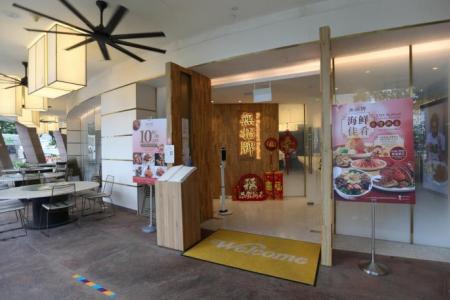No Signboard still makes a meal of it amid rental red ink
Restaurants in the No Signboard Group are still dishing up meals while the firm grapples with huge demands for unpaid rent that threaten to close two of its outlets and may even send the company itself belly up.
While the two Mom's Touch Chicken and Burger eateries fight to stay open, it's business as usual at No Signboard Seafood, Little Sheep Hotpot and No Signboard Sheng Jian, said Mr Robson Lee, the company's corporate legal adviser, on Friday (Feb 4).
No Signboard Seafood has two outlets, at Esplanade and Geylang, there is a Little Sheep Hotpot at Orchard Gateway and a No Signboard Sheng Jian at Northpoint City.
A third Mom's Touch outlet, at Eastwood Centre, is not affected by the letters of demand.
The two affected eateries are also open while the parent firm tries to find a resolution to the crisis, which was triggered by letters of demand for $176,000, mainly rent.
One is a claim for $12,161.10 from The Centrepoint Singapore in Orchard Road, the other for $163,965.56 from Milano Central at the PLQ Mall in Paya Lebar Quarter.
The Straits Times understands that Frasers Property Retail, which operates The Centrepoint, is discussing possible solutions.
The Centrepoint eatery has owed rent since last December.
Many food and beverage (F&B) outlets across the island have been struggling to stay afloat for the past two years amid an unprecedented series of lockdowns and other restrictions due to the pandemic.
No Signboard told the Singapore Exchange on Thursday that the rental claims will have an adverse impact on its financial position and performance, noting that the landlords have threatened legal action if the arrears are not met.
The Catalist-listed firm said last week that it may not be able to continue as a going concern and requested a voluntary suspension of its shares.
Other seafood chains and businesses have also felt the impact of the Covid-19 pandemic.
"With the Covid-19 regulations, which caps dine-in capacity, demand for the traditional seafood restaurant concept, which caters to larger groups, are naturally curtailed, or effectively disallowed under the regulations," said a spokesman for the Jumbo Group.
The chain has shifted its focus towards casual dining brands such as hawker stall chain Kok Kee Wonton Noodles and Chao Ting Pao Fan to help bridge the fall in revenue from its full-service outlets.
The spokesman added that the group remains cautiously optimistic due to factors such as the accelerated pace of vaccination and vaccinated travel lanes bringing in more tourists.
A spokesman for a traditional Chinese restaurant which declined to be named said such outlets have taken the biggest hit among F&B establishments during the pandemic, suffering more than 80 per cent drop in sales compared with the pre-pandemic period.
"The price hike of oil by at least 50 per cent added on to the overhead operational cost," said the spokesman, adding that additional costs are absorbed by the company as promotions are aggressively pushed out to attract customers, making profit margins thin.
"We have seen many well established brands that had given up. During the time that we gradually emerge from the pandemic, which we can hardly see the end of, we may still lose even more old established brands that are part of Singapore's heritage," he added.
Some big brands bowed out of the F&B sector last year in 2021, including Chinatown Food Street, Swee Kee Eating House and Black Angus Steakhouse while Prima Tower Revolving Restaurant and Imperial Treasure Nan Bei Restaurant were among the closures in 2020.
Get The New Paper on your phone with the free TNP app. Download from the Apple App Store or Google Play Store now


